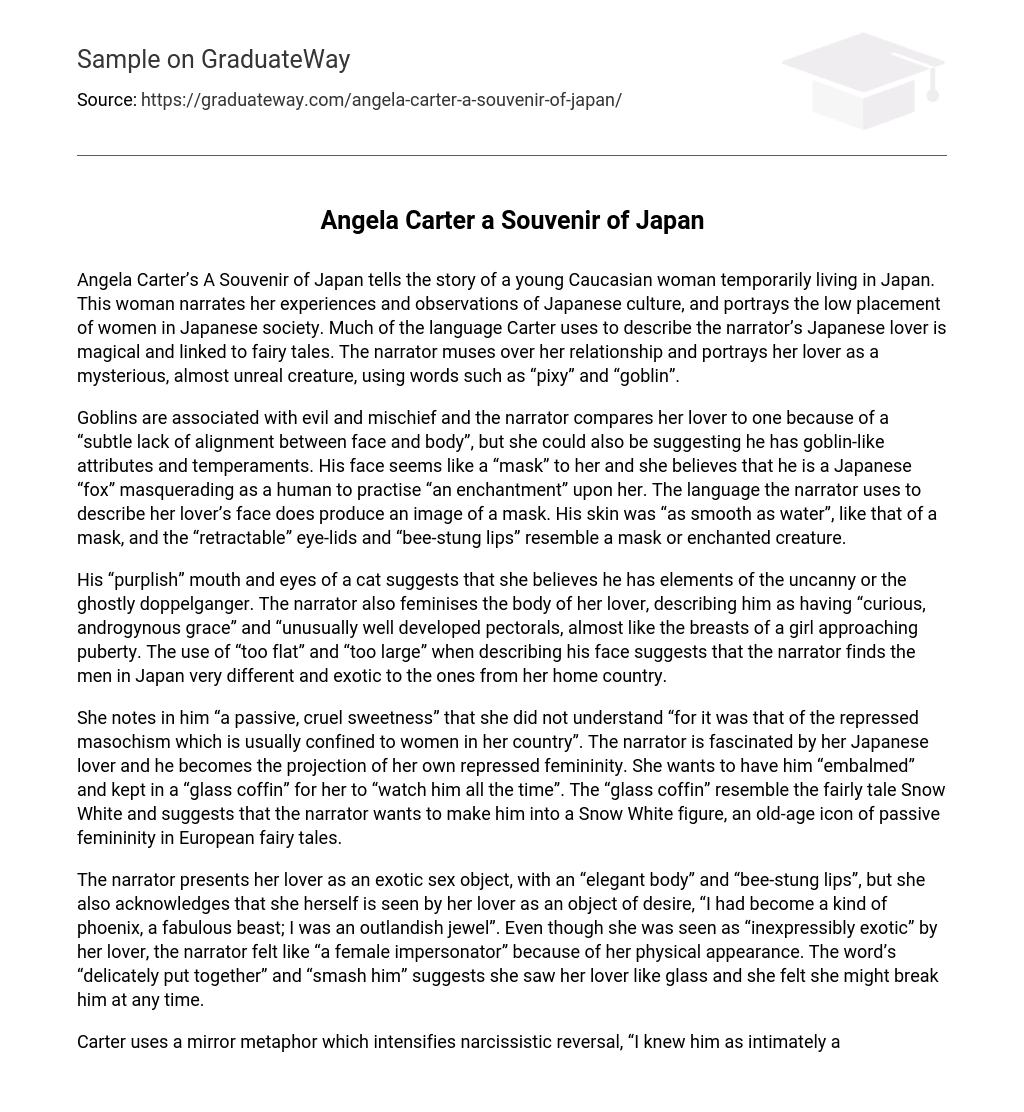Angela Carter’s A Souvenir of Japan tells the story of a young Caucasian woman temporarily living in Japan. This woman narrates her experiences and observations of Japanese culture, and portrays the low placement of women in Japanese society. Much of the language Carter uses to describe the narrator’s Japanese lover is magical and linked to fairy tales. The narrator muses over her relationship and portrays her lover as a mysterious, almost unreal creature, using words such as “pixy” and “goblin”.
Goblins are associated with evil and mischief and the narrator compares her lover to one because of a “subtle lack of alignment between face and body”, but she could also be suggesting he has goblin-like attributes and temperaments. His face seems like a “mask” to her and she believes that he is a Japanese “fox” masquerading as a human to practise “an enchantment” upon her. The language the narrator uses to describe her lover’s face does produce an image of a mask. His skin was “as smooth as water”, like that of a mask, and the “retractable” eye-lids and “bee-stung lips” resemble a mask or enchanted creature.
His “purplish” mouth and eyes of a cat suggests that she believes he has elements of the uncanny or the ghostly doppelganger. The narrator also feminises the body of her lover, describing him as having “curious, androgynous grace” and “unusually well developed pectorals, almost like the breasts of a girl approaching puberty. The use of “too flat” and “too large” when describing his face suggests that the narrator finds the men in Japan very different and exotic to the ones from her home country.
She notes in him “a passive, cruel sweetness” that she did not understand “for it was that of the repressed masochism which is usually confined to women in her country”. The narrator is fascinated by her Japanese lover and he becomes the projection of her own repressed femininity. She wants to have him “embalmed” and kept in a “glass coffin” for her to “watch him all the time”. The “glass coffin” resemble the fairly tale Snow White and suggests that the narrator wants to make him into a Snow White figure, an old-age icon of passive femininity in European fairy tales.
The narrator presents her lover as an exotic sex object, with an “elegant body” and “bee-stung lips”, but she also acknowledges that she herself is seen by her lover as an object of desire, “I had become a kind of phoenix, a fabulous beast; I was an outlandish jewel”. Even though she was seen as “inexpressibly exotic” by her lover, the narrator felt like “a female impersonator” because of her physical appearance. The word’s “delicately put together” and “smash him” suggests she saw her lover like glass and she felt she might break him at any time.
Carter uses a mirror metaphor which intensifies narcissistic reversal, “I knew him as intimately as I knew my own image in a mirror. In other words, I knew him only in relation to myself”. The mirror reflects an image reversed sideways, producing the apparent opposite of the one in front of the mirror; the mirror image, however, cannot be a radical alterity since it only reflects the negative or a derivative of one’s own image. Luce Irigaray’s Speculum of the Other Woman (1974) explores this aspect of the mirror metaphor in relation to gender.
It argues that the specula logic of Western philosophical discourse represents woman as the negative of the male norm; a woman serves as man’s mirror, an instrument for man’s narcissistic speculation of his own masculinity. The narrator describes Japan as “a man’s country”, and that women are less valued than men, thus a conflict of social values is introduced. Men are dominant and the birth of boys is celebrated, emphasising that Japan is “a man’s country”, with an “annual boy’s festival”. The narrator describes the role of the women; how they just occupy the “inner room” and rarely come out of it.
Women were expected to wait at home, “he did not expect me to go out of it”, which suggests the men are dominant and the women are expected to be submissive. Living with her Japanese lover, the narrator is expected to live like this and she experiences more extreme conditions of womanhood than in her own country. The idea of a lower placement of women in Japan’s society contrasts to the ideas from her Western word, “at least they do not disguise the situation”. The narrator then acknowledges the idea that women are just seen as objects of passion in Japan, deciding it is better to be seen as such than to have no value at all.
She justifies it with “at least one knows where one is”, which might show some of her misgivings at her own society that doesn’t openly talk about the value of women. At the end of the story the narrator acknowledges her relationship with her Japanese lover will “inevitably fail” and that the “intangible reflections” they saw in one another’s eyes were “reflections of nothing but appearances in a city dedicated to seeming”. Like Oscar Wilde, who claimed that “in fact, Japan is pure invention” the narrator knows that her experience in Japan is a dream and that women’s position in society was diminutive in comparison to her Western world.





